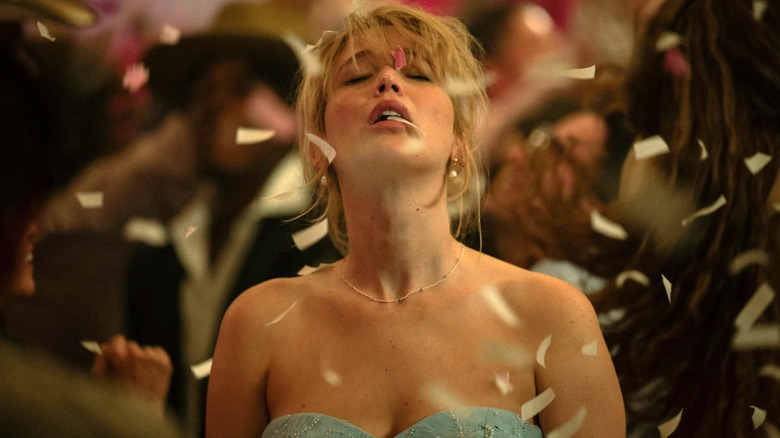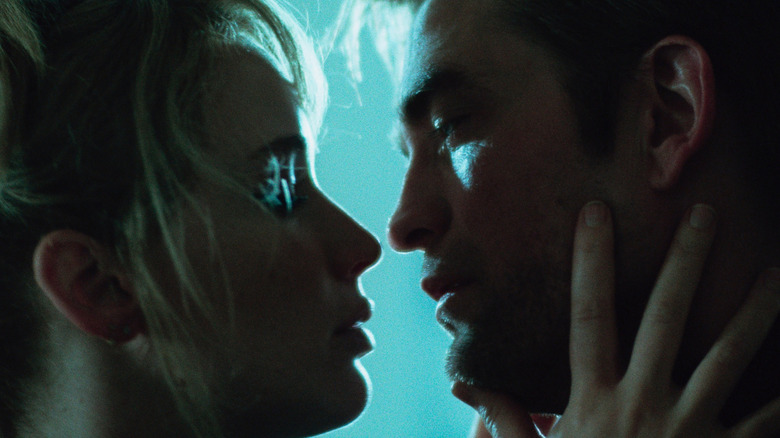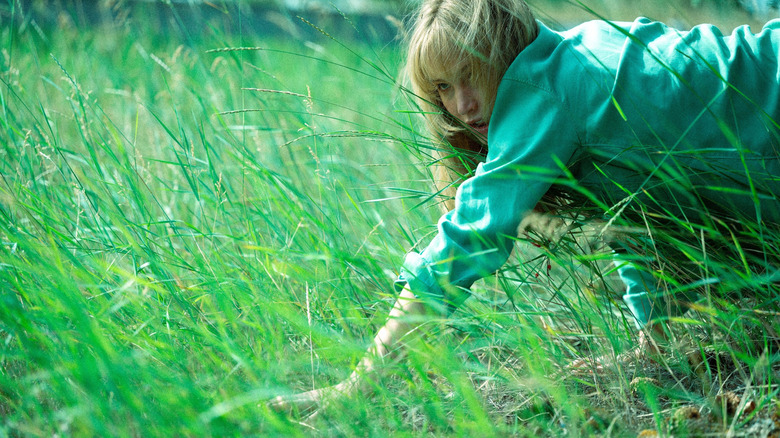Die My Love Review: Jennifer Lawrence Carries Lynne Ramsay's Frustrating Drama
- Good Jennifer Lawrence performance
- Interesting use of music
- Supporting cast gets wasted
- Grows dull without much character development
Lynne Ramsay's new movie "Die My Love" exists because producer Martin Scorsese read the 2017 novel by Ariana Harwicz in his book club and couldn't stop thinking that the main character was a perfect role for Jennifer Lawrence. The inspiration for that casting choice was Lawrence's performance as the unnamed title character in Darren Aronofsky's divisive allegory "mother!," which infamously got an "F" grade from CinemaScore audience polling.
Similar to "mother!," "Die My Love" begins with Lawrence's character Grace moving to a dilapidated old house in the middle of nowhere with her husband Jackson (Robert Pattinson), and ends with their relationship falling apart in flames. Where "mother!" was driven by the horror of claustrophobia, however, "Die My Love" is driven by the ennui of loneliness. Grace spends most of her time alone in her house while Jackson's away working, accompanied only by her baby and, for one early stretch of the movie, a very annoying dog. Take one guess as to what happens to the dog.
As your guess may have indicated, the other big commonality between "Die My Love" and "mother!" is that neither movie is the least bit concerned with being likable. I wouldn't be shocked if "Die My Love" also gets an F CinemaScore or thereabouts; the distribution company MUBI must be hoping Katniss Everdeen and Edward Cullen draw enough curious moviegoers on opening weekend before word of mouth gets out about just how alienating the film is to mainstream tastes. I'm with Scorsese in defending "mother!" — I loved its big ideas and captivating sense of escalation even if its extremity bordered on tastelessness — but count me among those baffled by "Die My Love." Maybe there's something I'm not getting here, but as far as I'm concerned, "Die My Love" comes alive in individual scenes yet feels stultifying as a whole.
Who even are these people?
There are two obvious answers for what "Die My Love" is about: postpartum depression and the dissolution of a relationship. I can't speak to how realistically the film depicts the former subject, though one aspect I found interesting is that for all her depression and mania, Grace doesn't resent being a mother. "He's perfect," she says of her baby. It's "everything else" that's the problem in her life. Jackson is a big part of "everything else." We're shown that they used to be passionate in love-making — seeing stars as good-looking as Jennifer Lawrence and Robert Pattinson partake in such scenes makes up much of the film's entertainment value — but since the baby arrived, their marriage has been completely sexless (and not for any lack of carnal desire on Grace's part).
One big problem in Grace's life that's weirdly under-explored is her complete lack of friends. When she's with other people, it's usually Jackson's family; her mother-in-law Pam (Sissy Spacek) is just about the only person who tries to help her with raising a child. LaKeith Stanfield shows up for like five seconds as a neighbor she might be having an affair with or might just be imagining one — the worst waste of an "Atlanta" cast member since Zazie Beetz in the exact same imaginary romance subplot in "Joker." Insert Doofenshmirtz "two nickels" meme.
Late in the film, a psychologist gives a simple explanation for Grace's friendlessness. I was glad they finally acknowledged the big elephant in the room while also wondering what was the point of waiting over 90 minutes for such acknowledgement. It's not a "twist" of the sort that prompts re-evaluation of the preceding events, but is instead the sort of information that might have been useful to know earlier in terms of being able to empathize with the character. I'm left wondering why the film doesn't build a story around that, instead of flailing about with barely a story at all.
More impressive in moments than as a whole
There are moments where "Die My Love" becomes interesting. The use of music, an area where Lynne Ramsay is clearly indebted to Martin Scorsese, is consistently great throughout. I particularly liked the use of "Kooks" by David Bowie in a moment that hints at a sense of hope that will soon prove short-lived, as well as the attention-grabbing punk rock opening credits. The co-mingling of ink and breast milk in a scene where Grace tries to paint is a memorable metaphorical image. The most dramatically interesting sequence involves Jackson's father Harry (Nick Nolte), dealing with dementia, refusing to acknowledge his son's ownership of the house that used to belong to his brother. While Nolte doesn't feel as wasted as LaKeith Stanfield, I would have liked to see more of him.
And I appreciate how much Jennifer Lawrence commits to the movie's madness. Whether dancing her ass off or prowling around like an animal on all fours, she's always worth watching, and she knows how to sell the movie's more humorous moments. If only I cared as much about her underwritten character as she cares about her performance — and if Jackson made any sense as a character beyond just making me think, "wow, this guy's an idiot" — maybe I'd be higher on "Die My Love." And I fully acknowledge there's maybe something I'm not getting that would make the film's different elements click into place. What I fear is that there's not that much here to get, and that the film's repetition through the same beats with little in the way of character development is just tiresome sound and fury signifying ... not nothing, but not nearly as much as I would want there to be.
"Die My Love" opens in theaters on November 7.


